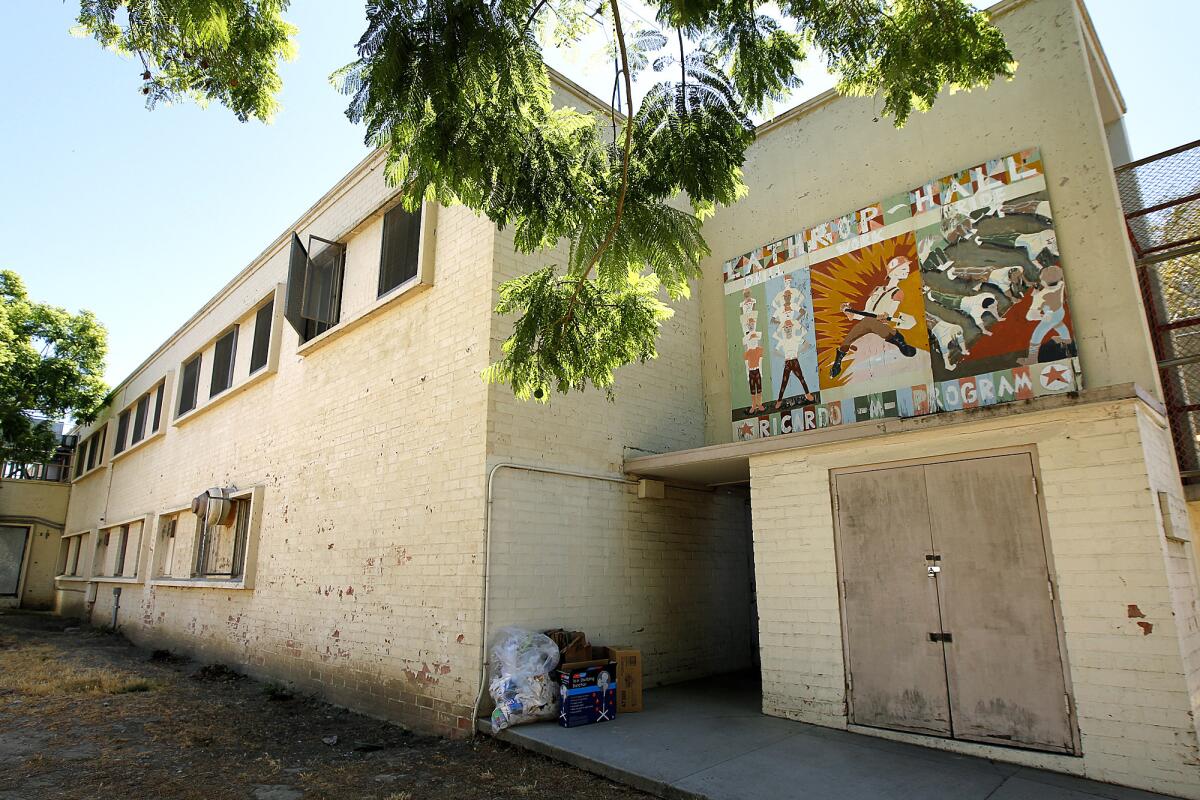Advocates and attorneys debate best approach to juvenile defense in L.A. County

L.A. County supervisors voted Tuesday to look into options for improving its system for defending minors accused of crimes. Above, an old juvenile hall building.
Advocates, former juvenile offenders and attorneys who represent children accused of crimes agree that Los Angeles County’s system for providing juveniles with legal defense is flawed, but disagree -- sometimes vehemently -- about the best way to fix it.
Los Angeles County supervisors voted Tuesday to commission a report on options for overhauling the way juveniles are defended.
Those options could include changing the pay structure for the private attorneys who are contracted to represent some juveniles; transferring the duties to the county’s alternate public defender’s office; or combining the public defender and alternate public defender into a single office with a division responsible for handling conflicts.
See the most-read stories this hour >>
The so-called panel attorneys represent juveniles whose families can’t afford a private attorney and who can’t be represented by the public defender’s office due to a conflict. They are paid a flat fee of $340 to $360 per case and must pay for training and investigators, if needed, out of their own pockets.
A report released last month by UC Berkeley’s Chief Justice Earl Warren Institute on Law and Social Policy found L.A. was the only large California county that pays attorneys representing youths a flat per-case fee -- rather than an hourly rate, salary, or fee based on the type of case -- and does not give them access to investigators.
It also found that youths represented by the panel attorneys were more likely than those represented by public defenders to be transferred to adult court.
Elizabeth Calvin, an advocate in the children’s rights division of Human Rights Watch, told the board she was “horrified” by the findings.
“There is no more important decision that this county makes about a child, no more far-reaching impact on a child’s life than to put them into the adult system,” she said. “It’s an important decision that deserves important resources.”
Several advocates spoke in favor of handing off the panel attorneys’ duties to the alternate public defender, including Carol Chodroff. A former public defender and juvenile defense and policy attorney, Chodroff said the current system “falls woefully short of our constitutional obligation to provide children with competent legal counsel.”
The private attorneys, many of whom agreed that the current pay structure puts them at a disadvantage, took umbrage at the idea that the kids they represent get worse service.
“Over 25 years ago, when I applied to law school, my reasoning for becoming a lawyer was to defend and protect the rights of children,” Pamela DiBello, who heads the panel of attorneys representing youths at the Pomona courthouse, told the board. “That has been a passion of mine for over 25 years.”
DiBello said afterward that panel attorneys are often assigned the more serious and complex cases and had repeatedly asked for and been denied more resources. She said she had put in unpaid time to advocate for the youths assigned to her, even after they were no longer her clients.
“Do I think that things could be improved? Absolutely,” she said. “Get rid of the flat fee, give us access to investigators, give us social workers in every courtroom. ... These are things we’ve asked the county to do for years, and we’ve been told no every time.”
Supervisor Mark Ridley-Thomas, who called for the overhaul of the system along with Sheila Kuehl, said the proposal was not meant as a “personal attack on panel attorneys.”
“We see this as a structural issue,” he said.
Join the conversation on Facebook >>
Kent Mendoza, 22, told the county supervisors that he had faced trial as an adult when he was a minor, but the case was sent back to juvenile court, where he said he was assigned to a public defender who was “very committed to my case.” She worked out a sentence less harsh than he would have otherwise received, he said.
Mendoza said he now goes to school full time and works for the Los Angeles Area Chamber of Commerce.
“I was convicted and I was accountable for the things I did,” he said. “But if it wasn’t for her ... I would probably be doing time in prison. I would probably be doing worse.”
The board asked the county’s chief executive and top attorney to report back in 90 days with recommendations on how to overhaul the system.
Twitter: @sewella
ALSO
San Francisco approves fully paid leave for new parents
Father threatened gay son over his sexual orientation, siblings told authorities
Southern California braces for summer blackouts due to Porter Ranch gas leak
More to Read
Sign up for Essential California
The most important California stories and recommendations in your inbox every morning.
You may occasionally receive promotional content from the Los Angeles Times.











